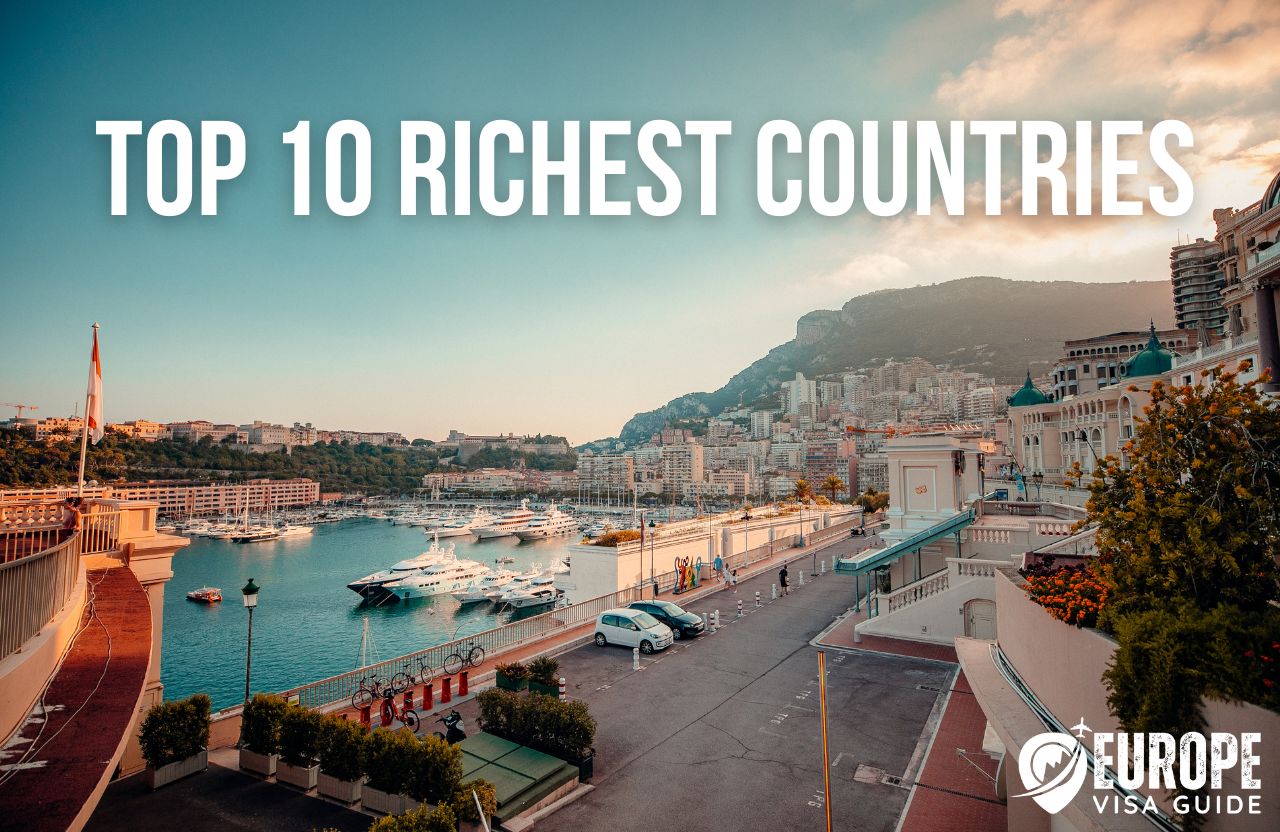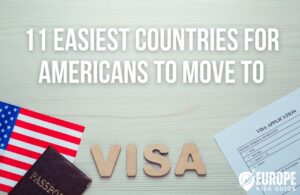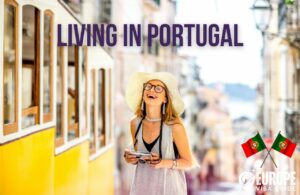
Table of Contents
In today’s globalized world, wealth and economic prosperity are often associated with the success and development of a country. The richest countries are characterized by high GDP per capita, indicating a higher standard of living, better infrastructure, and greater economic opportunities for their citizens. In this comprehensive guide, we will explore the top 10 richest countries in the world and delve into the various factors that contribute to their economic success. Whether you’re considering relocation or simply curious about the economic powerhouses of our world, this guide will provide valuable insights.
1. Introduction to Richest Countries
In today’s interconnected world, economic prosperity plays a vital role in determining a country’s power and influence. The wealth of the richest countries in the world is often measured by their GDP per capita, which indicates the economic output per person. While GDP per capita alone does not paint a complete picture of a country’s wealth distribution or overall well-being, it serves as an important benchmark for comparing the economic strength of the richest countries in the world.
2. Luxembourg: A Small Nation with Enormous Wealth
Luxembourg, a small landlocked country in Europe, stands out as the richest country in the world with a remarkable GDP per capita of $141,590. Despite its modest size, Luxembourg has achieved extraordinary economic success and has become a global financial center. The country’s wealth can be attributed to several factors, including its strategic location, favorable tax policies, and highly skilled workforce.
Location and Connectivity
Situated in the heart of Europe, Luxembourg enjoys easy access to various markets in the region. It serves as a vital hub for transcontinental transport routes, including rail lines, roads, and maritime shipping routes. Despite being landlocked, Luxembourg has leveraged its central location to become a key player in global trade and commerce.
Tax Incentives and Business-Friendly Policies
Luxembourg’s economic policies have played a significant role in attracting businesses and foreign investment. The country offers tax incentives for foreign companies, making it an attractive destination for establishing headquarters or regional offices. Additionally, Luxembourg has streamlined immigration procedures, facilitating the recruitment of skilled workers from around the world.
Highly Skilled Workforce
A highly educated and skilled workforce is one of Luxembourg’s greatest assets. Over half of the population holds a bachelor’s degree or higher, making it one of the most educated nations globally. This well-educated workforce has attracted multinational corporations and contributed to the country’s economic growth.
How to live there
Luxembourg’s membership in the European Union (EU) grants EU/EEA and Swiss citizens the freedom to live and work in the country without a visa. Non-EU citizens can obtain a residence permit through various means, such as work, study, proof of independent means, or investing a minimum of €500,000 in Luxembourg. After five years of residency, individuals can apply for Luxembourg citizenship, which also allows for dual citizenship.
3. Singapore: A Thriving Economy in Southeast Asia
Singapore, often referred to as the “Lion City,” has emerged as a global economic powerhouse with a GDP per capita of $131,430. This city-state in Southeast Asia has achieved remarkable economic success through its highly developed free-market economy, low levels of corruption, and business-friendly environment.
Diversified Economy and Financial Services
Singapore’s economy is highly diversified, with strong sectors in finance, banking, healthcare, and manufacturing. The city-state serves as a regional financial hub, attracting multinational corporations and financial institutions. Its robust financial services industry, coupled with low corporate tax rates and pro-business policies, has contributed significantly to Singapore’s wealth.
Strategic Location and Trade
Singapore’s strategic location has made it a major hub for international trade and travel in Southeast Asia. Its bustling port is one of the busiest in the world, facilitating billions of dollars worth of trade annually. The city-state’s strong trade ties with other countries, coupled with its efficient infrastructure, have bolstered its economic growth.
Highly Educated Workforce
Singapore has invested heavily in education, producing a highly skilled and university-educated workforce. Over three-quarters of Singaporeans aged 25 to 64 have completed at least upper secondary education, and almost half hold university qualifications. This well-educated workforce has attracted global companies and contributed to Singapore’s economic success.
How to live there
Singapore offers several immigration schemes for foreigners looking to live and work in the country. These include the Employment Pass (work permit) for individuals sponsored by a Singaporean company, the Entrepreneur Pass for those starting a business, and the Personalised Employment Pass (PEP) for individuals not tied to a specific employer. Other schemes include the S Pass for mid-level technical employees and the Global Investor Programme, which offers a fast-track route to permanent resident status in return for an investment in the country.
4. Ireland: Innovation and Foreign Investment Drive Economic Growth
Ireland, often referred to as the “Emerald Isle,” has experienced significant economic growth in recent years, leading to a GDP per capita of $131,030. The country’s commitment to education, innovation, and attracting foreign investment has contributed to its economic success.
Education and Skilled Workforce
Ireland has made substantial investments in education, resulting in a highly skilled and educated workforce. Over two-thirds of the Irish population aged 15-64 have completed upper secondary education, and almost a quarter possess tertiary qualifications. This pool of highly qualified workers has attracted multinational corporations and fueled economic growth in various industries.
Foreign Direct Investment
Ireland has been successful in attracting foreign direct investment (FDI) through its business-friendly policies and low corporate tax rates. Many multinational corporations, including tech giants like Microsoft, Apple, and Facebook, have established their European headquarters in Ireland. The country’s favorable tax environment and supportive regulatory framework have made it an attractive destination for foreign companies.
Strong Trade Ties and Export Industries
Ireland benefits from strong trade ties with other countries, including the United States and EU member states. The country is a leading exporter in sectors such as agriculture, food and drink, pharmaceuticals, chemicals, machinery, and software. Its export-oriented industries have contributed significantly to Ireland’s economic growth and prosperity.
How to live there
Ireland allows free movement for British citizens due to the Common Travel Area rights. As an EU member state, citizens of any EU/EEA country or Switzerland can also move to Ireland freely. Non-EU citizens can obtain a residency permit through work or study. Additionally, Ireland offers an investor residency program starting at €1 million. Irish citizenship, which also grants EU citizenship, can be applied for after residing in the country for a minimum of five years.
5. Qatar: A Wealthy Nation Fueled by Oil and Gas Reserves
Qatar, a small Middle Eastern nation, is known for its vast oil and gas reserves, which have propelled it to become one of the richest countries in the world, with a GDP per capita of $113,670. The country’s wealth is primarily derived from its natural resources and strategic investments in various sectors.
Oil and Gas Reserves
Qatar possesses the third-largest reserves of natural gas globally and is a significant producer of oil. The export of oil and gas provides a substantial source of income for the country. Qatar’s prudent management of its energy resources has allowed it to accumulate significant wealth and diversify its economy.
Education and Healthcare Investments
The Qatari government has invested heavily in education and healthcare, creating a highly skilled and educated workforce. Qatar’s citizens benefit from generous subsidies and benefits, including full state healthcare. These investments in human capital have contributed to the high standard of living in the country.
Small Population and Wealth Distribution
Qatar’s wealth is distributed among a relatively small population. With a small number of citizens, per capita wealth is higher compared to countries with larger populations. The government’s focus on ensuring a high standard of living for its citizens has contributed to Qatar’s prosperity.
How to live there
Living in Qatar as a foreigner typically requires finding employment with a local employer who will sponsor a residence permit. The country has stringent requirements for obtaining citizenship, including at least 25 years of residency, proficiency in Arabic, proof of good conduct, and sufficient financial means to support oneself. Qatar does not recognize dual citizenship, so individuals must renounce their original nationality to become Qatari citizens.
6. Switzerland: Diversified Economy and Political Stability
Switzerland, renowned for its picturesque landscapes, chocolate, and political neutrality, ranks fifth among the world’s richest countries with a GDP per capita of $84,470. The country’s economic success is attributed to its diversified economy, political stability, and reputation for high-quality products and services.
Diversified Economy
Switzerland’s economy is highly diversified, with strong sectors in finance, banking, healthcare, manufacturing, and tourism. The country is home to numerous multinational corporations and renowned financial institutions. Its strong economy is driven by innovation, research and development, and a highly skilled workforce.
Political Stability and Neutrality
Switzerland is known for its long-standing political stability and neutrality. The country has avoided involvement in armed conflicts for over two centuries, making it an attractive destination for businesses and individuals seeking security and stability. Switzerland’s neutral stance has fostered a favorable environment for international cooperation and diplomacy.
Business-Friendly Environment
The Swiss government has created a business-friendly environment characterized by low corporate tax rates, efficient infrastructure, and favorable regulations. The country’s reputation for quality and precision has made its products highly sought after globally. Swiss-made goods, including watches, chocolates, and pharmaceuticals, are synonymous with excellence and craftsmanship.
How to live there
Switzerland is not a member of the European Union or the European Economic Area, but it still allows freedom of movement for Swiss citizens throughout Europe. EU/EEA citizens can also move freely to Switzerland. Non-EU citizens are subject to different immigration rules, including visas and residency permits. Swiss citizenship, although one of the most difficult to obtain, can be pursued after meeting specific requirements, including sufficient income and a minimum of six years of residence.
7. Norway: Natural Resources and High Quality of Life
Norway, often associated with breathtaking fjords and the Northern Lights, ranks sixth among the world’s richest countries, with a GDP per capita of $78,130. The country’s wealth is primarily derived from its significant natural resources and commitment to providing a high quality of life for its citizens.
Natural Resources
Norway’s abundant natural resources, including oil, gas, timber, and productive farmland, have been crucial in building the country’s wealth. The responsible management of these resources, coupled with a strong commitment to environmental sustainability, has allowed Norway to accumulate substantial wealth.
Sovereign Wealth Fund
Norway’s sovereign wealth fund, known as the Government Pension Fund Global, is one of the world’s largest funds, valued at $1.2 trillion. The fund invests in international stocks, bonds, and real estate, generating significant returns for the country. The fund’s assets contribute to Norway’s economic stability and support various public services and initiatives.
High Quality of Life
Norway consistently ranks among the countries with the highest quality of life. The country places a strong emphasis on social welfare, healthcare, education, and infrastructure development. Its citizens enjoy a high standard of living, excellent healthcare services, and extensive social benefits.
How to live there
Norway, although not an EU member state, is part of the European Economic Area (EEA). EU/EEA citizens, including those from Liechtenstein, Iceland, and Switzerland, can freely move to Norway. Non-EU citizens are subject to different rules and may require visas and residency permits. Norwegian citizenship can be pursued after meeting specific criteria, including sufficient income and a minimum of six years of residence. In 2020, Norway changed its laws to recognize dual citizenship.
8. United Arab Emirates (UAE): A Hub of Economic Activity in the Middle East
The United Arab Emirates (UAE), located in the Middle East, is known for its ultramodern skyline, luxurious lifestyle, and economic prosperity. With a GDP per capita of $77,270, the UAE ranks seventh among the world’s richest countries. The country’s wealth is fueled by its vast oil reserves, strategic investments, and business-friendly environment.
Oil and Gas Reserves
The UAE is a major player in the global oil and gas industry. Its substantial reserves and production capacity contribute significantly to the country’s wealth. The government has diversified the economy to reduce dependence on oil by investing in sectors such as tourism, finance, and construction.
Tax Benefits and Business-Friendly Policies
The UAE offers numerous tax benefits for companies and individuals, making it an attractive destination for businesses looking to reduce their tax burden. The absence of personal income tax and low corporate tax rates have incentivized foreign companies to establish a presence in the country. The UAE’s business-friendly policies and regulatory framework facilitate entrepreneurship and economic growth.
Infrastructure Development and Construction
The UAE’s construction industry has experienced rapid growth, driven by the demand for new infrastructure and development projects. The country’s commitment to building state-of-the-art transportation systems, iconic skyscrapers, and world-class tourist attractions has enhanced its global reputation and contributed to its economic success.
How to live there
Living in the UAE as a foreigner typically requires finding employment with a local employer who will sponsor a residence permit. The UAE also offers other avenues for living in the country, including the Golden Visa program for individuals holding a PhD, freelancer permits, business ownership, property ownership, and retirement visas.
9. United States: Economic Powerhouse and Global Leader
The United States, often referred to as the land of opportunity, is a global economic powerhouse with a GDP per capita of $75,180. As the world’s largest economy, the United States plays a vital role in shaping global markets and influencing economic trends.
Abundant Natural Resources
The United States is blessed with abundant natural resources, including coal, oil, gas, timber, and productive farmland. These resources have contributed significantly to the country’s economic prosperity and development. The United States is a major exporter of various commodities and is self-sufficient in many areas.
Innovation and Technological Advancements
The United States is renowned for its culture of innovation and technological advancements. The country is home to numerous tech giants, research institutions, and universities that drive innovation and contribute to economic growth. Silicon Valley, located in California, is a global hub for technology and entrepreneurship.
Global Trade and Financial Center
The United States has a robust international trade network and is a major player in global commerce. The country’s financial centers, such as Wall Street in New York City, facilitate global capital flows and investments. The United States is the headquarters for many multinational corporations and hosts a vibrant business ecosystem.
How to live there
The United States offers various immigration pathways, each with its own specific requirements. Temporary non-immigrant visas, such as student visas or work exchange visas, are common starting points for individuals seeking to move to the United States. Long-term immigrant visas are available for those who qualify, often requiring sponsorship from a U.S.-based company. The immigration process can be complex, and consulting specialized immigration services is recommended.
10. Brunei Darussalam: Oil and Gas Riches in Southeast Asia
Brunei Darussalam, a small nation located in Southeast Asia, ranks ninth among the world’s richest countries, with a GDP per capita of $74,200. The country’s wealth primarily stems from its vast oil and gas reserves, which have fueled economic growth and prosperity.
Oil and Gas Reserves
Brunei Darussalam possesses significant oil and gas reserves, making it one of the wealthiest nations in the world. The export of oil and gas provides a substantial source of income for the country. The government has invested in infrastructure development and social welfare programs, ensuring a high standard of living for its citizens.
Quality of Life and Government Subsidies
Brunei Darussalam offers a high quality of life for its citizens, with generous government subsidies for food, housing, and healthcare. Citizens enjoy full state healthcare benefits and have access to a range of social programs. The government’s commitment to social welfare and development has contributed to the country’s economic success.
Small Population and Wealth Distribution
With a small population, Brunei Darussalam’s wealth is distributed among a relatively small number of citizens. This distribution, along with the government’s focus on social welfare, ensures that the country’s wealth benefits its citizens. The government’s prudent management of its resources has allowed it to accumulate significant wealth.
How to live there
Living in Brunei Darussalam typically requires finding employment with a local employer who will sponsor a residence permit. Foreigners are subject to a quota system, and work permits are usually valid for a specific period. Medical tests and other requirements may also be necessary to obtain a work permit. As of now, there is no clear pathway to citizenship for foreigners.
11. San Marino: Financial Sector and Tourism Boost the Economy
San Marino, a microstate perched on the Italian Peninsula, ranks tenth among the world’s richest countries, with a GDP per capita of $72,070. Despite its small size, San Marino has managed to build a prosperous economy, fueled by its financial sector and vibrant tourism industry.
Financial Sector and International Banking
San Marino has attracted numerous international banks, making it a thriving financial center. The country’s favorable regulatory environment, coupled with its strategic location, has made it an attractive destination for financial institutions. The financial sector contributes significantly to San Marino’s economic prosperity.
Tourism and Cultural Heritage
San Marino’s rich cultural heritage and stunning landscapes make it a popular tourist destination. Millions of visitors flock to the country each year to explore its historic landmarks, such as the Guaita Tower, and enjoy its scenic beauty. The tourism industry plays a vital role in driving economic growth and providing employment opportunities.
High Standard of Living
San Marino residents enjoy a high standard of living, with access to top-notch healthcare, excellent infrastructure, and a wide range of high-quality consumer goods. The country’s wealth is reflected in its citizens’ quality of life, making it an attractive place to live and work.
How to live there
San Marino is not an EU member state, despite being surrounded by EU member Italy. One potential route to living in San Marino is by opening a company in the country and making a minimum investment of €150,000. Other options include investment in the country’s real estate market or taking advantage of special programs for foreign retirees. San Marino citizenship is challenging to obtain, requiring 30 years of residency and renunciation of the original nationality.
12. Conclusion
The top 10 richest countries in the world offer a glimpse into the economic powerhouses that shape our global landscape. From small nations like Luxembourg and San Marino to influential players like the United States and United Arab Emirates, these countries have achieved remarkable economic success through various factors, including natural resources, strategic investments, and business-friendly policies. Whether you’re considering relocation or simply intrigued by the economic prowess of these nations, understanding the factors that contribute to their wealth provides valuable insights into the global economy.
Keep in mind that while GDP per capita serves as a measure of economic output per person, it does not necessarily reflect the distribution of wealth within a country or the overall well-being of its citizens. Economic success should be evaluated in conjunction with other factors, such as income inequality, social welfare programs, and quality of life indicators.
As the global economic landscape continues to evolve, these countries will likely remain at the forefront of economic growth and development. By understanding the factors that have propelled them to success, we can gain valuable insights into the dynamics of wealth creation and economic prosperity.





